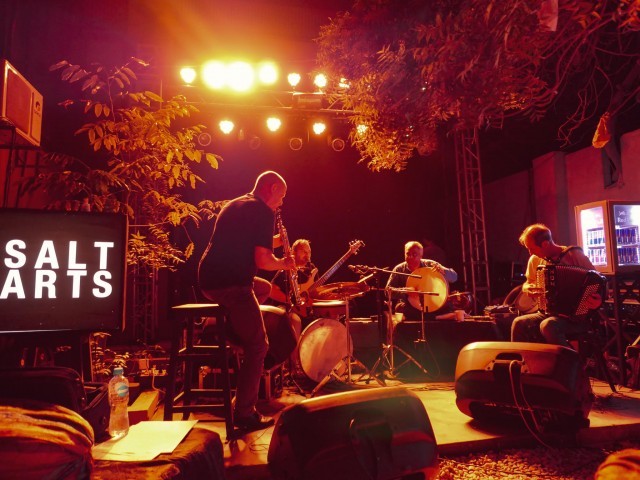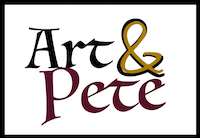
Tuesday’s performance by Ashraf Shareef Khan, Stracho Temelkovski and Jean-Charles Richard was nothing short of voodoo
PHOTO: JOHAN BJURMAN BERGMAN
KARACHI : It’s hard to understand that District 19 was once an ice factory. In fact, it’s hard to understand that District 19 is located in Karachi. With the warm orange lights, the familiar smell in the air, the young people and the music, we might as well have ended up on a hot July evening along the Seine. But the mirage breaks the moment the sewage fumes from Korangi Creek roll over the wall. We’re definitely in Karachi and its October.
We’ve come to District 19 on a Tuesday for a Salt Arts show, and it feels like we’ve ended up in someone’s living room cum private garden. From my days at the opera, I remember the intimate shows as more challenging than those for 1000+ and send the musicians a kind thought.
Salt Flights, Salt Arts’ new platform, brands itself as one bringing international artists to Pakistan and 30 seconds into the programme, we can confirm that Salt Arts have at least succeeded on one count; three out of four men on stage have an unmistakably French accent. However, after Stracho Temelkovski (whose name is Macedonian) introduces the first song – from the last breath to the last breath – in his thick French accent, the country bias ends, and we take off on a world tour.
Rohail Hyatt responds to copyright infringement claims against ‘Coke Studio 12’
The first song offers us a gentle meeting of east and west using the electric bass (from the USA) and the sitar (from India) and sets the tone for what’s to come. It’s a clean, well-mixed sound. Nothing is distorted, and the two instruments play neatly side by side, intertwining scales. It’s exciting to see a sitar hanging out and playing ball with the cool kids. With his lyrical and bold, at times almost rock star-esque handling of the sitar, Ashraf Sharif Khan does his part to ensure that those who haven’t heard Beatles’ Norwegian Wood get to experience what a sitar can add to western music. Then Stratcho adds what seems like his signature instrument present in all songs of the set; the beatbox. And he’s good. He switches between tempos and bars without hesitation.
The musical trio, played by only two people and representing two major world powers, is then joined by Germany in the form of an accordion. But Jean Francois Baez’s accordion doesn’t sound like bratwurst and lederhosen, instead, it brings a Balkan feel to the mix, which makes it even more interesting. The chocolate on top of the global Sundae is the Belgian-invented soprano saxophone, played by Jean-Charles Richard, who also wins the award for ‘most French name of the band’ (or maybe he is Belgian too?). Regardless of his origins, the man is a virtuoso on the saxophone, who throughout the evening manages to change the sound of the instrument from southern blues to haunting jazz via teasing pop.
Most of the evening’s songs follow a similar pattern in various permutations spiced up with extravagant melodies. Luckily, the audience matches the melodies. It’s a relatively young crowd, but cool kids in their 40s have also snuck in. It is not evident that everyone is there for the music. And who can blame them; with fashion week coming to an end, Karachi’s beautiful people have had to find new watering holes. It’s cool, upscale and a bit unaffordable if you weren’t excused from buying the Rs6, 000 ticket.
Towards the end of the programme, Stratcho picked up yet another new instrument. It looked like the love child of a lute and a guitar; it is an Algerian Mandole. And indeed, Mr T’s sheer musical skill is one of the big takeaways of the evening. He is a true multi-instrumentalist to the point of provocation. At the end of the show, all I wanted to do is rock up to him with some exotic instrument he’s never seen before and challenge him to play it.
Dates for the fifth annual Lahore Music Meet 2020 are now out
Unfortunately, I suspect he would master it just like he does the Mandole. Its sound is warm, and spreads across the garden like a soft rug, on top of which Sharif Khan’s sitar tip-toes. The two friends are then joined by Germany and Belgium, for some meticulously coordinated running of eastern scales, all guided by Maestro Stracho who weaves the musical worlds together both in notes and through the names of the songs which draw on themes of unity and humanity.
At a few points during the set, the quartet actually manages to achieve musical unity, making their global group of instruments sound like one United Nations of music. And for a moment they leave the audience with a luxury few can afford in today’s world; the unfamiliar feeling of perfect harmony. Perhaps, Stratcho and his crew could help us all get that feeling a little more often by stopping by Geneva on their way back to France. A masterclass in harmony might be just what world leaders need right now.
Have something to add to the story? Share it in the comments below.
Read full story






